This article is in the Category
Celebrating CLiPPA 2022
Charlotte Hacking provides an insight into the collections shortlisted for this year’s Centre for Literacy in Primary Poetry Award.
 At the Centre for Literacy in Primary Education, we are proud to be the National Poetry Centre for Primary Schools, and our Centre for Literacy in Primary Poetry Award (CLiPPA) is the only national award set up solely to celebrate poetry published for children. This year’s shortlist, announced in association with the Manchester Poetry Library on 4 May, offers a rich picture of the quality of poetry currently being published for children of all ages.
At the Centre for Literacy in Primary Education, we are proud to be the National Poetry Centre for Primary Schools, and our Centre for Literacy in Primary Poetry Award (CLiPPA) is the only national award set up solely to celebrate poetry published for children. This year’s shortlist, announced in association with the Manchester Poetry Library on 4 May, offers a rich picture of the quality of poetry currently being published for children of all ages.
Caterpillar Cake by Matt Goodfellow, illustrated by Krina Patel-Sage, is a wonderful introduction to poetry for children at the earliest 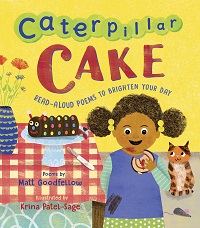 stages of reading. The book contains an expertly curated selection of the perfect ingredients to set children off on a journey to a lifelong love of poetry. Delicious rhymes such as the title poem, Caterpillar Cake and Let’s Go! that children won’t be able to resist joining in with and acting out; counting rhymes that also invite children to tune into the sounds of words through rhyme and alliteration like Skim and Zany Zoo; calming poems like Here it Comes and River Lullaby show that poetry can have different moods and feelings for different times and poems related to children’s everyday experiences like When I Swing and My Shell, offer the perfect invitation for children to see that they could have a voice to express their own thoughts and feelings and to write poetry of their own.
stages of reading. The book contains an expertly curated selection of the perfect ingredients to set children off on a journey to a lifelong love of poetry. Delicious rhymes such as the title poem, Caterpillar Cake and Let’s Go! that children won’t be able to resist joining in with and acting out; counting rhymes that also invite children to tune into the sounds of words through rhyme and alliteration like Skim and Zany Zoo; calming poems like Here it Comes and River Lullaby show that poetry can have different moods and feelings for different times and poems related to children’s everyday experiences like When I Swing and My Shell, offer the perfect invitation for children to see that they could have a voice to express their own thoughts and feelings and to write poetry of their own.
It feels like Matt really does know his childhood audience – the humour is genuinely funny, the language is expertly crafted and thoughtfully placed, allowing the poems to sing on and off the page, the content is never patronising and enables children to see themselves in poetry and to be stretched to connect with it at a much deeper level. Krina Patel-Sage’s bold and bright illustrations work in harmony with the text, providing children with the opportunity to become immersed in the world of each poem.
Stars With Flaming Tails by Valerie Bloom, illustrated by Ken Wilson-Max, is a veritable feast of poetry from one of the country’s best 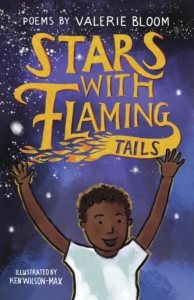 known and highly regarded children’s poets. Valerie’s experience and knowledge about both children and poetry sing from every page of this book, offering the reader a multitude of opportunities to be engaged, curious, and imaginative.
known and highly regarded children’s poets. Valerie’s experience and knowledge about both children and poetry sing from every page of this book, offering the reader a multitude of opportunities to be engaged, curious, and imaginative.
Specific sections on Friends and Family, Our World and Animals allow children to bring personal experiences and interests to children’s reading and interpretation of poems like Mum Says She Loves Me, Forest and Poison Dart Frog; encouraging them to think and engage more deeply with the ideas and messages behind the words. A specific section titled Fun With Forms invites children to become aware of specific forms of poetry, from the familiar riddles, Behind a White Wall and Twins to the lesser-known elfje, Green; offering an invitation for children to have a go at exploring the patterns of the form and perhaps to craft their own. The final section, Unbelievable, is a playful exploration of language and wordplay, sharing how playful and performative language can be, in poems such as The Isle of Negatyves and The Zimbats. Ken Wilson-Max’s monochrome illustrations are perfectly paired with the words; what he sees and brings out in the poems he has chosen to illustrate take the reader beyond the words on the page, encouraging them to consider themes and ideas at greater depth.
Cloud Soup by Kate Wakeling, illustrated by Elīna Brasliņa, is a joyous celebration of language, creative thinking and poetic form. Every 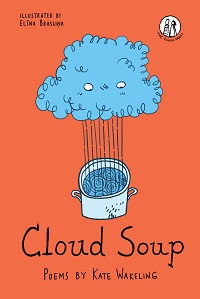 poem in this collection is perfectly placed, nothing seems extraneous and there is a superb range of themes to allow children to gain a sense of awe and wonder, to explore and investigate and to think creatively and critically about the world around them.
poem in this collection is perfectly placed, nothing seems extraneous and there is a superb range of themes to allow children to gain a sense of awe and wonder, to explore and investigate and to think creatively and critically about the world around them.
Kate’s love of language sings in every poem and her expertise in the craft of poetry writing allows her to play with form appropriate to the subject matter. The poems range from the deftly humorous Mr Mangle’s Beard to the deeply emotive Grandma and the Sea. So many poems share a genuine curiosity and delight with the world around us. In such poems as the ode to the Stick Insect to an exploration of the water cycle in The water in the glass you are holding right now, children are encouraged to observe closely and invited to question and find out more. Poems such as Weird Cake and Paean (or Eleven Uses for a Garden Pea) encourage the reader to think differently and creatively. There will be a poem to engage and delight every child. Once again, as in her previous collection Moon Juice (CLiPPA winner 2017), Elīna Brasliņa’s illustrations are created with great insight; she sees beyond the words, offering the child reader a place to both consolidate and extend their thoughts around poems they have read.
Being Me, by Liz Brownlee, Matt Goodfellow and Laura Mucha, illustrated by Victoria Jane Wheeler, is such an important collection of 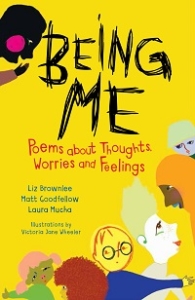 poetry for our time, bearing witness to children’s thoughts, feelings, experiences and emotions in a way that genuinely offers recognition, affirmation and hope. The three poets have worked in perfect harmony to create a collection that shows their child readers that their emotions and experiences matter, as well as demonstrating how writing about such things can help them make sense of their thoughts and feelings.
poetry for our time, bearing witness to children’s thoughts, feelings, experiences and emotions in a way that genuinely offers recognition, affirmation and hope. The three poets have worked in perfect harmony to create a collection that shows their child readers that their emotions and experiences matter, as well as demonstrating how writing about such things can help them make sense of their thoughts and feelings.
Specific experiences of individual children, explored in poems such as Michael, Find Me and Bobby, will support children in recognising and empathising with the experiences of others around them. Poems like A Thought, Argument and Albatross help children to be aware of experiences that affect children’s lives beyond the walls of school and those like Thought Machine, The Land of Blue, Free and I Believe in Me explore the feelings and emotions we all go through in our lives in a way that will open up wider conversations around recognising, affirming the importance of and working through emotions. Victoria Jane Wheeler’s illustrations offer a special kind of insight to the words on the page, playing with line, media and style to engage the reader in deep and meaningful ways.
The Crossing by Manjeet Mann is a superbly well-researched, rich and emotive narrative, bravely highlighting and providing rich insights 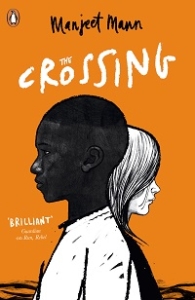 into complex topics and offering an opportunity for young people to critique the kind of incendiary rhetoric they will experience through the mainstream media. A lot of intensive research went into pulling the story together.
into complex topics and offering an opportunity for young people to critique the kind of incendiary rhetoric they will experience through the mainstream media. A lot of intensive research went into pulling the story together.
Covering complex themes and issues, and events that remain so real for many people in the world, carries a weight of responsibility to make the characters and events authentic and to ensure that the book represented those affected truthfully. The skill in Manjeet’s writing is that she does exactly this. Over the course of three or four years she worked diligently to research and collect the stories that helped her to shape the narrative; Sammy’s story is pieced together from the very real stories of child and adult refugees, who have made the same journey for the same reasons. Lead protagonist Nat’s brother Ryan also features heavily in the storyline, as Nat watches him drawn into a far-right group, still grieving the loss of his mother and becoming more and more disaffected by his inability to get a job, with the family about to lose their home due to their lack of income; as part of the ongoing research, she sat in on workshops and took on the experiences of people in similar situations.
The fact that the story is told in verse brings a sharpness and intensity that engages the reader in the narrative in a completely different way from a novel. The voices and stories of the two characters are cleverly linked, with the last word of one character’s voice in each verse being the first of the next character as a metaphor of their interconnectedness, before they even come into each other’s lives. Judicious use of language focusses the reader and what’s left in the white space between lines and verses challenges them to think about what has been presented at a deeper level.
You might be deciding now who you think might be the winner, but you’ll need to wait until 8 July to find out which one of those five collections will take home the prize. The award ceremony will be hosted live at the Southbank Centre’s Queen Elizabeth Hall in London, but you’ll be able to watch the show and see the poets perform as the show will be livestreamed. Details of how to watch will be advertised via CLPE’s website and social media channels.
A wide range of resources including videos of all the shortlisted poets, teaching notes and information about poetic forms and devices can be found free on CLPE’s website.
Schools wishing to shadow this year’s award and enter the shadowing competition for a chance to perform on the stage at the award ceremony at the Queen Elizabeth Hall, Southbank Centre on 8 July alongside the shortlisted poets can find information about the shadowing scheme online.
Charlotte Hacking is the Learning and Programme Director and member of the CLiPPA judging panel at CLPE, an independent UK charity dedicated to helping schools develop literacy learning that transforms lives.



